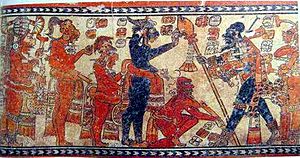Chama (Maya site) facts for kids
Chama (pronounced Cha-MAH) is an ancient Maya site located high in the mountains of Guatemala. It's found in the Chixoy River valley, in a region called Alta Verapaz. This site was active during the Late Classic period of Maya history, which was a time when the Maya civilization was at its peak. Chama is about 50 kilometers (31 miles) northwest of a town called San Pedro Carchah.
Discovering Chama
In the early 1900s, a researcher named Robert J. Burkitt from the University of Pennsylvania Museum carried out small digs at Chama. These excavations helped us learn more about the site. Chama was located on the edge of the main Maya kingdoms in the lowlands. Some experts believe that people from the lowlands settled in Chama around the early 700s AD. After this, Chama developed its own special style of pottery, which was unique but didn't last for a very long time.
The Unique Chama Vases
Chama is especially famous for its cylindrical vases. These vases have a very distinct look.
- They often feature black and white zigzag patterns, called chevron motifs, painted around the top and bottom edges.
- The colors used are usually bright white, strong red, and black.
- These colors are painted on a background that is a unique yellow to yellow-orange color.
Instead of showing scenes of kings and warriors, like many other Maya vases, Chama vases often show different kinds of pictures.
- They frequently feature animals that look like humans.
- They also show images of gods and goddesses.
- Many vases depict scenes from Maya myths and legends.
Studying Chama's Art
The anthropologist Elin C. Danien has done important studies on the Chama vases that are kept at the Penn Museum. What makes the Penn Museum's collection special is that it has "provenance information" for its pieces. This means they know exactly where each vase was found. Knowing the provenance helps researchers understand the history and meaning of these ancient artworks much better.
See also
 In Spanish: Chamá (sitio arqueológico) para niños
In Spanish: Chamá (sitio arqueológico) para niños
 | Sharif Bey |
 | Hale Woodruff |
 | Richmond Barthé |
 | Purvis Young |


